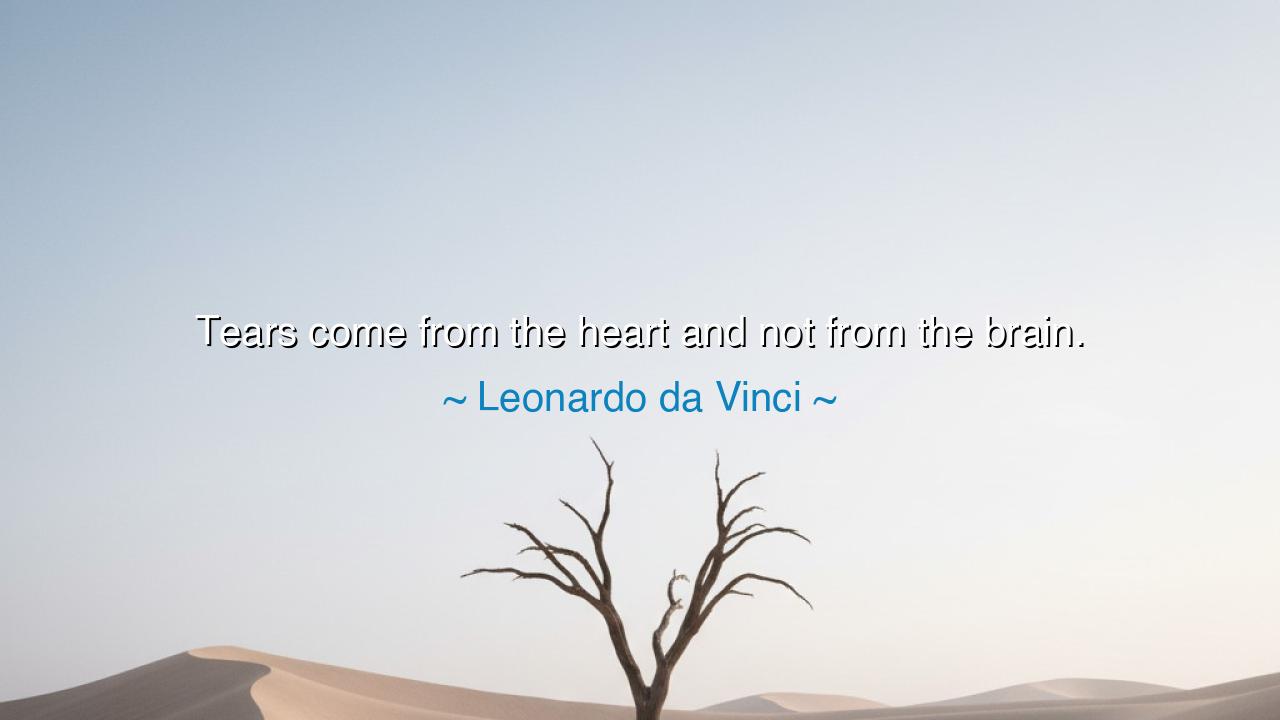
Tears come from the heart and not from the brain.






The immortal Leonardo da Vinci, whose mind soared between science and soul, once declared: “Tears come from the heart and not from the brain.” In this simple yet profound truth, the master revealed that the deepest human emotions cannot be measured by intellect nor explained by logic. The heart, that ancient symbol of love, sorrow, and compassion, is the true source of tears—the sacred water of the soul. Though da Vinci was a man of reason, he understood that the essence of humanity lies not in thought alone, but in the mysterious wellspring of feeling that resides beyond reason’s reach.
The origin of this quote can be traced to Leonardo’s reflections on human nature, for he was as much a philosopher as an artist. In his journals—those boundless oceans of sketches and observations—he often pondered the connection between body and spirit. He studied anatomy with the eye of a scientist, yet his curiosity reached deeper, into the realm of the unseen. He knew that while the brain may govern thought, the heart governs truth. When he said that tears come from the heart, he was not speaking of anatomy but of emotion, of the invisible language through which the soul expresses what words cannot.
To cry, in Leonardo’s vision, is not a sign of weakness but of humanity itself. Tears are not born from calculation or thought; they arise when the heart can no longer contain its fullness—whether of grief, of beauty, or of compassion. They are the overflowing of inner truth. In laughter, the spirit celebrates; in tears, it reveals. The brain may observe and reason, but only the heart can ache, and only the heart can release that ache in the form of tears.
Consider the story of Mary Magdalene at the tomb of Christ. When she found it empty, she wept not with the mind of reason but with the heart of love. Her tears were not the result of thought but of devotion. Yet those tears, born from sorrow, became the seed of revelation—she was the first to behold the risen Christ. In that moment, her tears were transformed from despair into awe. So it is with all true weeping: when the heart releases its burden, clarity follows, and sorrow becomes wisdom. The ancients knew this truth well—Aristotle wrote that tragedy purifies the soul through pity and fear, and the poets of old spoke of tears as divine rain that cleanses the spirit.
Leonardo’s insight reaches even beyond emotion—it speaks to the balance between the heart and the mind. The world exalts the intellect, yet without the heart’s guidance, knowledge becomes cold and unfeeling. The brain can invent machines, but only the heart can create art; the brain can build weapons, but only the heart can seek peace. It is the heart that reminds the mind to serve rather than to dominate, to heal rather than to harm. Tears are the proof that we are not mere mechanisms of thought but living vessels of empathy.
From this truth comes a powerful lesson: do not suppress your tears, for they are not signs of frailty but of strength. To cry is to feel, and to feel is to live. When sorrow visits you, let your tears fall—they are the soul’s way of cleansing itself. When beauty moves you, do not hold back the tears that well within your eyes—they are gratitude made visible. The stoic who refuses to weep may seem strong, but his strength is brittle; the one who allows his heart to speak through tears is made supple, alive, and free.
In a world that often prizes logic over love, remember da Vinci’s wisdom. Let the heart lead when the brain falters. When you find yourself in pain, do not silence your feelings beneath the weight of pride or reason. Instead, let the tears flow, for they are the most honest expression of what it means to be human. Through them, sorrow becomes understanding, and understanding becomes peace.
Thus, as Leonardo da Vinci taught, “Tears come from the heart and not from the brain.” Cherish this truth, for in every tear lies a fragment of divinity—the reflection of a soul unafraid to feel. And when you see another’s tears, do not turn away, but honor them, for they are the universal language of compassion. The heart that weeps is the same heart that loves, and it is through that love that humanity endures.






AAdministratorAdministrator
Welcome, honored guests. Please leave a comment, we will respond soon